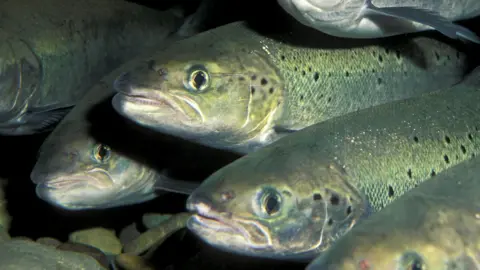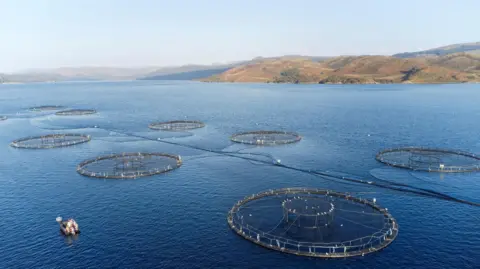Salmon farming improvements making 'slow progress'
 Getty Images/Schafer & Hill
Getty Images/Schafer & HillMSPs have stopped short of calling for a ban on any expansion in the controversial salmon farming sector despite "slow progress" in improving its environmental impact and governance.
Holyrood's rural affairs committee said it was concerned that dozens of recommendations from a damning report published in 2018 have still not been fully implemented.
The committee said it had given "serious consideration" to calls for a moratorium but was concerned about the impact on rural jobs, so it will review progress again in a year.
The industry body Salmon Scotland insists it has made "significant" changes.
The committee has spent nine months looking at whether sufficient improvements have been made since a series of reports in 2018 raised welfare standards, mortality and pollution concerns.
 Getty Images/Richard Johnson
Getty Images/Richard JohnsonThis latest report from MSPs said the committee was "disappointed" that fish deaths have remained around the same level - about a quarter of stocks.
One witness told the inquiry that mortalities of 17 million fish was "not a sustainable practice."
But perhaps of greatest concern was the changing reasons for those deaths which historically have been largely attributed to parasitic sea lice.
The lice attach themselves to the skin of salmon and spread rapidly through stocks and onto passing wild fish.
Algae and jellyfish
Warmer waters, driven by climate change, led to unusual mass mortality events in 2022 and 2023 caused by algae blooms and micro-jellyfish.
The committee said it was worried that preventing such events was "not currently within the operational capability of the industry".
Concerns were also raised about a lack of consistency in how mortality data was collected and published.
MSPs were told the explanations could be "super vague" and that reporting was still done on a voluntary basis.
To improve transparency, the committee recommends that reporting be made mandatory, however, Rural Affairs Secretary Mairi Gougeon told MSPs she felt voluntary arrangements were "proportionate."
Committee convener Finlay Carson said he recognised that the industry had been investing to overcome the challenges.
But he added: "Further progress should have been made in implementing the... recommendations of 2018 as well as anticipating the impact of climate change and rising sea temperatures on the industry."
As part of their inquiry, members of the committee visited a fish farm at Dunstaffnage near Oban for a fact-finding exercise.
Welfare campaigners Animal Equality UK - whose representatives had given evidence to MSPs - later accused the site's owners Scottish Sea Farms of painting a "wholly inaccurate" picture of the industry by removing hundreds of dead fish from pens before the visit.
Scottish Sea Farms insisted the removals were a part of routine operations.
The charity has welcomed the inquiry's findings and said it reaffirmed that the industry remains "in a state of crisis."
Executive director Abigail Penny added: "The committee recommends one year for salmon producers to clean up their act; we will be watching closely to ensure they do."
However, Dale Vince, founder of the Green Britain Foundation, said the recommendations fell "woefully short" of addressing the environmental damage caused by the salmon sector.
He accused the committee of an "abdication of responsibility".
Economic value
Scotland's salmon sector generated £337m for the Scottish economy in 2022, according to Scottish government figures.
It directly employs about 2,200 people - many in rural areas - with the sector estimating that it indirectly supports around 10,000 jobs.
Tavish Scott from Salmon Scotland says farms have "world-leading" welfare and environmental standard.
He added: "We continue to innovate which is why survival rates are at a four-year high, sea lice levels are at a historic low and consumer sales of our nutritious fish are on track to break all records.
"We engaged constructively with MSPs to provide evidence of the significant progress our sector has made, and we note that most of their recommendations are for the Scottish government."
Rural Affairs Secretary Mairi Gougeon said significant progress had been made in a number of areas including the management of sea lice and environmental protection.
She added that she recognised the call to make improvements at pace in other key areas and that she would consider the report carefully.
